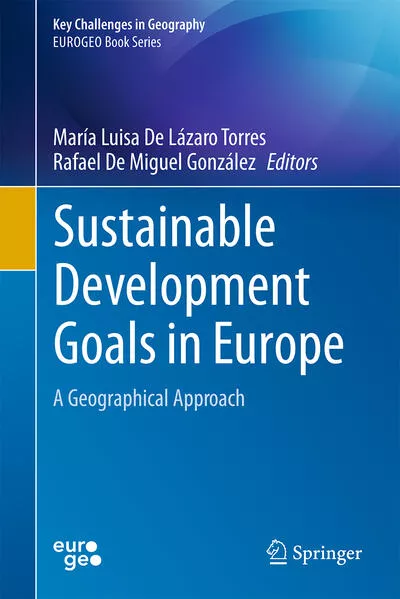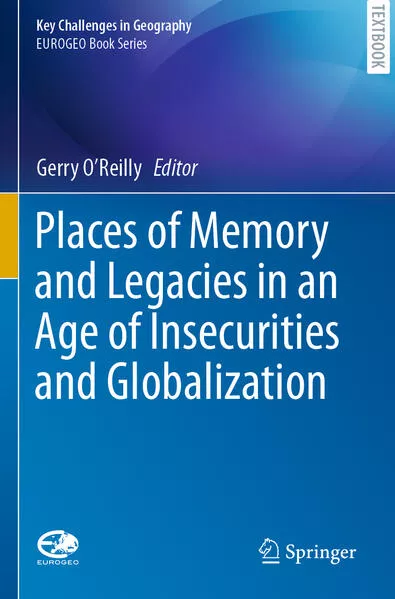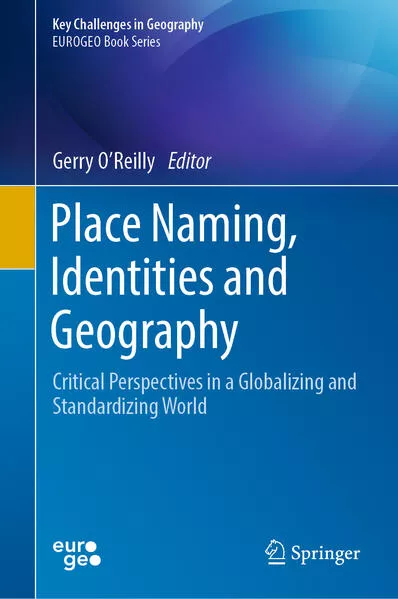Key Challenges in Geography
Places of Memory and Legacies in an Age of Insecurities and Globalization
Chronologie aller Bände (1 - 4)
Die Reihenfolge beginnt mit dem Buch "Sustainable Development Goals in Europe". Wer alle Bücher der Reihe nach lesen möchte, sollte mit diesem Band von María Luisa De Lázaro Torres beginnen. Der zweite Teil der Reihe "Place Naming, Identities and Geography" ist am 09.04.2023 erschienen. Mit insgesamt 4 Bänden wurde die Reihe über einen Zeitraum von ungefähr 3 Jahren fortgesetzt. Der neueste Band trägt den Titel "Compromised Geography".
- Anzahl der Bewertungen für die gesamte Reihe: 0
- Ø Bewertung der Reihe: 0
- Start der Reihe: 27.02.2023
- Neueste Folge: 28.12.2025
Diese Reihenfolge enthält 4 unterschiedliche Autoren.
- Autor: De Lázaro Torres, María Luisa
- Anzahl Bewertungen: 0
- Ø Bewertung:
- Medium: Buch
- Veröffentlicht: 27.02.2023
- Genre: Politik
Sustainable Development Goals in Europe
The aim of this book is to provide a synthesis of the newest research in Geography concerning the Sustainable Development Goals (SDG’s). Although the world is strongly interconnected, the majority of the chapters in this volume focus on Europe or the work of European researchers. Each chapter of this book focusses on one of the 17 SDG’s providing in-depth knowledge from a geographical perspective, fostering comprehensive research on these global targets to end poverty, fight inequality and injustice, and tackle climate change.
The Sustainable Development Goals are part of the 2030 Agenda for Sustainable Development. To achieve them, it will be necessary for all stakeholders, including citizens (civil society, doctors, teachers), governments, private sector to collaborate.
- Autor: O'Reilly, Gerry
- Anzahl Bewertungen: 0
- Ø Bewertung:
- Medium: Buch
- Veröffentlicht: 09.03.2023
- Genre: Politik
Places of Memory and Legacies in an Age of Insecurities and Globalization
Due to new world orders, geopolitical reconfigurations and ideals that emerged after 1918, many countries ranging from the Baltic and Russia to the Balkans, Turkey and Greece, eastern and central Europe to Ireland are continuing with commemorations regarding their specific memories in the wider Europe. Shared memorial spaces can act in post conflict areas as sites of reconciliation; nonetheless `the peace' cannot be taken for granted with insecurities, globalization, and nationalisms in the USA and Russia; the UK's Brexit stress and populist movements in Western Europe, Visegrád and Balkan countries. Citizen-fatigue is reflected in socio-political malaise mirrored in France's Yellow Vest movement and elsewhere. Empathy with other peoples' places of memory can assist citizens learn from the past. Memory sites promoted by the EU, Council of Europe and UNESCO may tend to homogenize local memories; nevertheless, they act as vectors in memorialization, stimulating debate and re-evaluating narratives.
This textbook combines geographical, inter-cultural and inter-disciplinary approaches and perspectives on spaces of memory by a range of authors from different countries and traditions offers the reader diverse and holistic perspectives on cultural geography, dynamic geopolitics, globalization and citizenship.
- Autor: O’Reilly, Gerry
- Anzahl Bewertungen: 0
- Ø Bewertung:
- Medium: Buch
- Veröffentlicht: 09.04.2023
- Genre: Politik
Place Naming, Identities and Geography
- Autor: Soares, Laura
- Anzahl Bewertungen: 0
- Ø Bewertung:
- Medium: Buch
- Veröffentlicht: 28.12.2025
- Genre: Sonstiges
Compromised Geography
Geography encompasses knowledge, provides skills, and creates unique opportunities that help us understand and engage with the changes happening in the world. The consolidation of territorial dynamics rooted in the past, along with the "shrinking" of time and space due to technological innovations, brings new responsibilities to the research, training, and professional practice of geographers. This notion of "Compromised Geography," grappling with the rapid reconfiguration of the world at different scales—whether environmental, geopolitical, social, economic, or educational—was the focus of presentations at the 2024 EUROGEO Conference held at the University of Porto. This book compiles the highest-quality contributions from the conference, sharing methods, processes, and experiences that equip geographers to optimize their reserach and practices.



